[New search]
[Help]
�
STATUTORY INSTRUMENTS
2001 No. 1144
LEGAL SERVICES COMMISSION, ENGLAND AND WALES
The Criminal Defence Service (General) Regulations 2001
| |
Made |
22nd March 2001 | |
| |
Laid before Parliament |
26th March 2001 | |
| |
Coming into force |
2nd April 2001 | |
The Lord Chancellor, in exercise of the powers conferred on him by sections 12, 15 and 20 of, and Schedule 3 to, the Access to Justice Act 1999[1], makes the following Regulations:
PART I
GENERAL
Citation and commencement
1.
These Regulations may be cited as the Criminal Defence Service (General) Regulations 2001 and shall come into force on 2nd April 2001.
Interpretation
2.
In these Regulations:
"the Act" means the Access to Justice Act 1999;
a solicitor who has obtained a higher courts advocacy qualification in accordance with regulations and rules of conduct of the Law Society;
"assisted person" means a person in receipt of funded services;
"appropriate officer" means:
in the case of the Crown Court, the court manager;
in the case of a magistrates' court, the justices' clerk; and
in the case of the Court of Appeal, the Courts-Martial Appeal Court or the House of Lords, the registrar of criminal appeals
and, in any case, includes an officer designated by him to act on his behalf in that regard;
"the Commission" means the Legal Services Commission established under section 1 of the Act;
"the Costs Committee" means a committee appointed under arrangements made by the Commission to deal with, inter alia, applications for appeal against, or review of, assessments of costs;
"funded services" means services which are provided directly for an individual and funded for that individual as part of the Criminal Defence Service established under sections 12 to 18 of the Act;
"judge of the court" means, in relation to a magistrates' court, a single justice;
"representation order" means a document granting a right to representation under section 14 of the Act; and
"very high cost case" means a case with regard to which:
(a) if the case proceeds to trial, that trial would be likely to last for 25 days or longer; or
(b) the defence costs with regard to any one defendant (or group of defendants represented by the same firm of solicitors) are likely to amount to £150,000 or greater (such sum to include the solicitor's fees and disbursements, advocate's fees, and VAT).
Criminal proceedings
3.
- (1) For the purposes of this regulation, "the 1998 Act" means the Crime and Disorder Act 1998[2].
(2) The following proceedings are criminal proceedings for the purposes of section 12(2)(g) of the Act:
(a) civil proceedings in a magistrates' court arising from failure to pay a sum due or to obey an order of that court where such failure carries the risk of imprisonment;
(b) proceedings under sections 1, 2 and 4 of the 1998 Act relating to anti-social behaviour orders or sex offender orders;
(c) proceedings under section 8(1)(b) of the 1998 Act relating to parenting orders made where an anti-social behaviour order or a sex offender order is made in respect of a child;
(d) proceedings under section 8(1)(c) of the 1998 Act relating to parenting orders made on the conviction of a child;
(e) proceedings under section 9(5) of the 1998 Act to discharge or vary a parenting order made as mentioned in sub-paragraph (c) or (d);
(f) proceedings under section 10 of the 1998 Act to appeal against a parenting order made as mentioned in sub-paragraph (c) or (d); and
(g) proceedings under sections 14B, 14D, 14G, 14H, 21B and 21D of the Football Spectators Act 1989[3] (banning orders and references to a court).
(3) Proceedings:
(a) in the Crown Court, following committal for sentence by a magistrates' court;
(b) to quash an acquittal under the Criminal Procedure and Investigations Act 1996[4]; and
(c) for confiscation and forfeiture in connection with criminal proceedings under RSC Order 115 in Schedule 1 to the Civil Procedure Rules 1998[5]
are to be regarded as incidental to the criminal proceedings from which they arise.
(4) Applications for judicial review or habeas corpus relating to any criminal investigations or proceedings are not to be regarded as incidental to such criminal investigations or proceedings.
PART II
APPLICATIONS FOR REPRESENTATION ORDERS
Representation order
4.
- (1) Any application for the grant of a representation order shall be made on form A in the Schedule to these Regulations.
(2) Any application for the grant of a representation order in respect of the proceedings mentioned in section 12(2)(a) to (f) of the Act shall be made in accordance with regulations 6, 7 and 8.
(3) Any application for the grant of a representation order in respect of the proceedings mentioned in regulation 3(2) (criminal proceedings for the purposes of section 12(2)(g) of the Act):
(a) shall be made to the Commission; and
(b) may be granted only by the Commission or a person acting on behalf of the Commission where such function has been delegated in accordance with section 3(4) of the Act.
(4) Where an application under paragraph (3) is refused, the Commission shall provide to the applicant:
(a) written reasons for the refusal; and
(b) details of the appeal process.
(5) The appropriate officer of each court shall keep a record of every application to that court for a representation order, and of its outcome.
(6) The appropriate officer shall send to the Lord Chancellor such information from the record mentioned in paragraph (5) as the Lord Chancellor may request.
General power to grant representation
5.
The court, a judge of the court, or the registrar of criminal appeals may grant a representation order at any stage of the proceedings in the circumstances set out in these Regulations whether or not an application has been made for such an order.
Proceedings in a magistrates' court
6.
- (1) Other than where regulation 4(3) applies, an application for a representation order in respect of proceedings in a magistrates' court may be made:
(a) orally or in writing to the court; or
(b) in writing to the appropriate officer.
(2) Where an application is made to the court, it may refer it to the appropriate officer for determination.
(3) Where an application is refused, the appropriate officer shall provide to the applicant:
(a) written reasons for the refusal; and
(b) details of the appeal process.
Proceedings in the Crown Court
7.
- (1) Other than where regulation 4(3) applies, an application for a representation order in respect of proceedings in the Crown Court may be made:
(a) orally or in writing to the Crown Court;
(b) in writing to the appropriate officer of that court;
(c) orally or in writing to a magistrates' court at the conclusion of any proceedings in that magistrates' court;
(d) orally or in writing to a magistrates' court inquiring into the offence as examining justices or sending for trial under section 51 of the Crime and Disorder Act 1998[6];
(e) where a magistrates' court has been given a notice of transfer under section 4 of the Criminal Justice Act 1987[7] (serious fraud cases), in writing to the appropriate officer of that magistrates' court;
(f) in the case of an appeal to the Crown Court from a magistrates' court, in writing to the appropriate officer of that magistrates' court;
(g) where the applicant was granted a representation order for proceedings in a magistrates' court and was committed for trial in the Crown Court under section 6(2) of the Magistrates' Courts Act 1980[8], in writing to the appropriate officer of the magistrates' court ordering the committal; and
(h) in the case of a retrial ordered under section 7 of the Criminal Appeal Act 1968[9], orally or in writing to the court ordering the retrial.
(2) An application for a representation order in respect of representations to the High Court against a voluntary bill of indictment may be made:
(a) in writing to the appropriate officer of the Crown Court; or
(b) orally to the judge considering the voluntary bill
and where any such order is granted it shall also apply to any proceedings to which the applicant is indicted.
(3) Where an application is made to the court, it may refer it to the appropriate officer for determination.
(4) Where an application is refused, the appropriate officer shall provide to the applicant:
(a) written reasons for the refusal; and
(b) details of the appeal process.
Proceedings in the Court of Appeal (Criminal Division) and the House of Lords
8.
- (1) An application for a representation order in respect of proceedings in the Court of Appeal or the House of Lords may be made:
(a) orally to the Court of Appeal, or a judge of the court; or
(b) in writing to the Court of Appeal, a judge of the court, or the registrar of criminal appeals ("the registrar").
(2) Where an application is made to the court, it may refer it to a judge for determination.
(3) Where an application is made to a judge, he may refer it to the registrar for determination.
(4) The registrar may:
(a) grant the application; or
(b) refer it to the court or a judge of the court.
(5) A representation order shall not be granted until notice of leave to appeal has been given in respect of the proceedings which are the subject of the application.
(6) Where a representation order is granted in respect of proceedings in the Court of Appeal, a judge or the registrar may specify the stage of the proceedings at which the representation order shall take effect.
(7) The House of Lords may not grant a representation order in respect of any proceedings.
PART III
SELECTION OF REPRESENTATIVE
Representation in magistrates' courts and some Crown Court proceedings
9.
- (1) The right conferred by section 15(1) of the Act, as regards representation in respect of any proceedings to which this regulation applies, shall be exercisable only in relation to those representatives who are:
(a) employed by the Commission to provide such representation; or
(b) authorised to provide such representation under a crime franchise contract with the Commission which commences on or after 2nd April 2001 and specifies the rate of remuneration for such representation.
(2) This regulation applies to:
(a) any criminal proceedings in a magistrates' court;
(b) any proceedings in the Crown Court mentioned in regulation 3(2);
(c) any appeal by way of case stated from a magistrates' court; and
(d) any proceedings which are preliminary or incidental to proceedings mentioned in sub-paragraphs (a) to (c).
(3) This regulation does not apply to proceedings referred to in section 12(2)(f) of the Act (proceedings for contempt in the face of a court).
Advocates in magistrates' courts
10.
- (1) A representation order for the purposes of proceedings before a magistrates' court may only include representation by an advocate in the case of:
(a) any indictable offence, including an offence which is triable either way; or
(b) proceedings under section 9 of, or paragraph 6 of Schedule 1 to, the Extradition Act 1989[10]
where the court is of the opinion that, because of circumstances which make the proceedings unusually grave or difficult, representation by both a solicitor and an advocate would be desirable.
(2) A representation order for the purposes of proceedings before a magistrates' court may not include representation by an advocate other than as provided in paragraph (1).
Representation in the Crown Court, Court of Appeal (Criminal Division) and House of Lords
11.
- (1) Subject to paragraph (2) and regulation 9, the right conferred by section 15(1) of the Act, as regards representation in respect of any proceedings in the Crown Court (other than proceedings mentioned in regulation 3(2)), Court of Appeal or House of Lords, shall be exercisable only in relation to those representatives who are:
(a) employed by the Commission to provide such representation; or
(b) authorised to provide such representation under a crime franchise contract with the Commission.
(2) Where the Commission has determined that representation in a very high cost serious fraud case shall be provided by a member of the Serious Fraud Panel, such right shall be limited to representatives who are for the time being members of that Panel.
(3) For the purposes of this regulation:
(a) a very high cost serious fraud case is a very high cost case with regard to which the offence with which the defendant is charged is primarily or substantially founded on allegations of fraud or other serious financial impropriety, or involves complex financial transactions; and
(b) the Serious Fraud Panel is a panel of solicitors appointed under arrangements made by the Commission to deal with such cases.
(4) This regulation does not apply to any proceedings referred to in section 12(2)(f) of the Act.
Advocates in the Crown Court, Court of Appeal (Criminal Division) and House of Lords
12.
- (1) A representation order may provide for the services of a Queen's Counsel or of more than one advocate in respect of the whole or any specified part of any proceedings only in the cases specified and in the manner provided for by the following paragraphs of this regulation; and in this regulation "junior counsel" means any advocate other than a Queen's Counsel.
(2) Subject to paragraphs (3) to (9), a representation order may provide for the services of a Queen's Counsel or of more than one advocate in any of the following terms:
(3) A representation order relating to proceedings in the Crown Court may be made in the terms of paragraph (2)(a) if and only if:
(a) in the opinion of the court the case for the assisted person involves substantial novel or complex issues of law or fact which could not be adequately presented except by a Queen's Counsel; and
(b) either:
(i) a Queen's Counsel or senior Treasury counsel has been instructed on behalf of the prosecution; or
(ii) the case for the assisted person is exceptional compared with the generality of cases involving similar offences.
(4) A representation order relating to proceedings in the Crown Court may be made in the terms of paragraph (2)(b)(iii) or (iv) if and only if:
(a) in the opinion of the court the case for the assisted person involves substantial novel or complex issues of law or fact which could not be adequately presented by a single advocate; and
(b) either:
(i) two or more advocates have been instructed on behalf of the prosecution;
(ii) the case for the assisted person is exceptional compared with the generality of cases involving similar offences;
(iii) the number of prosecution witnesses exceeds 80; or
(iv) the number of pages of prosecution evidence exceeds 1,000
and for this purpose the number of pages of prosecution evidence shall include all witness statements, documentary and pictorial exhibits and records of interview with the assisted person and with other defendants forming part of the committal documents or included in any notice of additional evidence.
(5) A representation order relating to proceedings in the Crown Court may be made in the terms of paragraph (2)(b)(i) or (ii) if and only if:
(a) in the opinion of the court the case for the assisted person involves substantial novel or complex issues of law or fact which could not be adequately presented except by a Queen's Counsel assisted by junior counsel; and
(b) either:
(i) the case for the assisted person is exceptional compared with the generality of cases involving similar offences; or
(ii) a Queen's Counsel or senior Treasury counsel has been instructed on behalf of the prosecution and one of the conditions in paragraph (4)(b)(i), (iii) or (iv) is satisfied.
(6) A representation order may be made in the terms of paragraph (2)(c) if and only if:
(a) the proceedings arise from a prosecution brought by the Serious Fraud Office;
(b) the court making the order considers that three advocates are required; and
(c) in the case of proceedings in the Crown Court, the conditions in paragraph (4) or (5) are satisfied.
(7) The fact that a Queen's Counsel has been or is proposed to be assigned under this regulation shall not by itself be a reason for making an order in any of the terms provided for by paragraph (2)(b) or (c).
(8) Where a Queen's Counsel has been or is proposed to be assigned under this regulation, no order in any of the terms provided for by paragraph (2)(b) or (c) shall be made where the case relates to an appeal to the Court of Appeal or to the House of Lords and it appears to the court at the time of making the order that representation can properly be undertaken by a Queen's Counsel alone.
(9) No order shall be made or amended so as to provide for representation:
(a) in the terms of paragraph (2)(b) unless the court making the order is of the opinion that the assisted person could not be adequately represented under an order in the terms of paragraph (2)(a);
(b) in the terms of paragraph (2)(b)(i) unless the court making the order is of the opinion that the assisted person could not be adequately represented under an order in the terms of paragraph (2)(b)(ii), (iii) or (iv);
(c) in the terms of paragraph (2)(b)(ii) unless the court making the order is of the opinion that the assisted person could not be adequately represented under an order in the terms of paragraph (2)(b)(iii) or (iv);
(d) in the terms of paragraph (2)(b)(iii) unless the court making the order is of the opinion that the assisted person could not be adequately represented under an order in the terms of paragraph (2)(b)(iv);
(e) in any of the terms provided for by paragraph (2)(c)(i) unless the court making the order is of the opinion that the assisted person could not be adequately represented under the corresponding order under paragraph (2)(c)(ii).
(10) Every application for a representation order in any of the terms provided for by paragraph (2), or for an amendment under paragraph (15), shall be in writing specifying:
(a) the terms of the order sought and the grounds of the application; and
(b) which of the conditions in paragraphs (3), (4), (5), (6) and (9) is relied upon in support of the order sought, and on what grounds it is contended that each such condition is fulfilled.
(11) A court may, before making a representation order in the terms provided for by paragraph (2) or amending the order under paragraph (15), require written advice from any advocate already assigned to the applicant on the question of what representation is needed in the proceedings.
(12) A court making a decision whether to make an order under paragraph (2) or to amend an order under paragraph (15) shall make annotations to the written application under paragraph (10), stating whether each of the conditions relied upon in support of the order made or sought is fulfilled.
(13) Subject to paragraph (14), a decision to make or amend a representation order so as to provide for the services of a Queen's Counsel or of more than one advocate may only be made:
(a) in the course of a trial or of a preliminary hearing, pre-trial review or pleas and directions hearing, by the judge presiding at that trial or hearing;
(b) where the proceedings are in the Crown Court, by a High Court judge, the resident judge of the Crown Court or (in the absence of the resident judge) a judge nominated for that purpose by the presiding judge of the circuit; or
(c) where the proceedings are in the Court of Appeal, by the registrar, a High Court judge or a judge of the Court of Appeal.
(14) A magistrates' court which may grant a representation order as respects any proceedings in the Crown Court by virtue of these Regulations may make:
(a) a representation order providing for the services of a Queen's Counsel without a junior counsel where the proceedings are a trial for murder and the order is made upon committal, transfer or sending for trial; or
(b) a representation order providing for the services of a Queen's Counsel with one junior counsel where the prosecution is brought by the Serious Fraud Office and the order is made upon receiving a notice of transfer under section 4 of the Criminal Justice Act 1987
but shall have no other power to make an order under this regulation.
(15) In proceedings to which paragraph (3), (4), (5) or (6) applies, a representation order may be amended:
(a) in any terms provided for by paragraph (2) in accordance with the provisions of this regulation; or
(b) to provide for representation by one junior counsel only.
(16) In every case in which a representation order is made under this regulation for the provision of funded services in terms provided for by paragraph (2)(b) or (c), it shall be the duty of:
(a) each representative:
(i) to keep under review the need for more than one advocate to be present in court or otherwise providing services; and
(ii) to consider whether the representation order should be amended as provided for in paragraph (15);
(b) Queen's Counsel, where the services of a Queen's Counsel are provided, to keep under review the question whether he could act alone.
(17) It shall be the duty of each representative, if of the opinion that the representation order should be amended as provided for in paragraph (15), to notify that opinion in writing:
(a) to the other representatives for the assisted person; and
(b) to the court
and the court shall, after considering the opinion and any representations made by any other representatives for the assisted person, determine whether and in what manner the representation order should be amended.
13.
The court may grant a representation order for representation by an advocate alone:
(a) in any proceedings referred to in section 12(2)(f) of the Act;
(b) in respect of an appeal to the Court of Appeal or the Courts-Martial Appeal Court; or
(c) in cases of urgency where it appears to the court that there is no time to instruct a solicitor:
(i) in respect of an appeal to the Crown Court; or
(ii) in proceedings in which a person is committed to or appears before the Crown Court for trial or sentence, or appears or is brought before that court to be dealt with.
Change of representative
14.
- (1) Where a representation order has been granted an application may be made to the court before which the proceedings are heard to select a representative in place of a representative previously selected, and any such application shall state the grounds on which it is made.
(2) The court may:
PART IV
WITHDRAWAL OF REPRESENTATION
15.
- (1) The court before which the proceedings are heard, or, in respect of any proceedings mentioned in regulation 3(2), the Commission, must consider whether to withdraw the representation order in any of the following circumstances:
(a) where any charge or proceedings against the assisted person are varied, the court or the Commission, as appropriate, must consider whether the interests of justice continue to require that he be represented in respect of the varied charge or proceedings;
(b) where the assisted person declines to accept a representation order in the terms which are offered;
(c) at the request of the assisted person; or
(d) where the representative named on the representation order declines to continue to represent the assisted person.
(2) Where representation is withdrawn, the appropriate officer or the Commission, as appropriate, shall provide written notification to the assisted person and to the solicitor (or, where there was no solicitor assigned, to the advocate), who shall inform any assigned advocate (or, where notification is given to the advocate, any other assigned advocate).
(3) On any subsequent application by the assisted person for a representation order in respect of the same proceedings, he shall declare the previous withdrawal of representation and the reason for it.
PART V
MISCELLANEOUS
Transfer of documents
16.
Where an individual is committed or sent for trial by a lower court to a higher court, or appeals or applies for leave to appeal from a lower court to a higher court, the appropriate officer of the lower court shall send to the appropriate officer of the higher court the following documents:
(a) a copy of any representation order previously made in respect of the same proceedings; and
(b) a copy of any application for a representation order which has been refused.
Authorisation of expenditure
17.
- (1) Where it appears to the solicitor necessary for the proper conduct of proceedings in the Crown Court for costs to be incurred under the representation order by taking any of the following steps:
(a) obtaining a written report or opinion of one or more experts;
(b) employing a person to provide a written report or opinion (otherwise than as an expert);
(c) obtaining any transcripts or recordings; or
(d) performing an act which is either unusual in its nature or involves unusually large expenditure
he may apply to the Costs Committee for prior authority to do so.
(2) The Commission may authorise a person acting on behalf of the Costs Committee to grant prior authority in respect of any application made under paragraph (1).
(3) Where the Costs Committee or a person acting on its behalf authorises the taking of any step specified in paragraph (1), it shall also authorise the maximum to be paid in respect of that step.
18.
A representative assigned to an assisted person in any proceedings in the Crown Court may apply to the court for prior authority for the incurring of travelling and accommodation expenses in order to attend at the trial or other main hearing in those proceedings.
19.
- (1) No question as to the propriety of any step, or as to the amount of the payment within the maximum authorised, with regard to which prior authority has been given under regulation 17 or 18 or under any contract, shall be raised on any determination of costs unless the representative knew or should reasonably have known that the purpose for which it was given had become unnecessary.
(2) Payment may be allowed on a determination of costs in respect of any step with regard to which prior authority may be given, notwithstanding that no such authority was given or that the maximum authorised was exceeded.
Restriction on payment
20.
Where a representation order has been made, the assisted person's solicitor or advocate shall not receive or be a party to the making of any payment for work done in connection with the proceedings in respect of which the representation order was made except such payments as may be made:
(a) by the Lord Chancellor or the Commission; or
(b) in respect of any expenses or fees incurred in:
(i) preparing, obtaining or considering any report, opinion or further evidence, whether provided by an expert witness or otherwise; or
(ii) obtaining any transcripts or recordings
where an application for an authority to incur such fees or expenses has been refused by the Costs Committee.
Notification of very high cost cases
21.
- (1) This regulation applies to very high cost cases where funded services are provided.
(2) Any solicitor who has conduct of a case which is a very high cost case shall notify the Commission in writing accordingly as soon as is practicable.
(3) Where a solicitor fails to comply with the provisions of this regulation without good reason, and as a result there is a loss to public funds, the court or Costs Committee, as appropriate, may refuse payment of his costs up to the extent of such loss.
(4) No payment under paragraph (3) shall be refused unless the solicitor has been given a reasonable opportunity to show why it should not be refused.
Duty to report abuse
22.
Notwithstanding the relationship between or rights of a representative and client or any privilege arising out of such relationship, where the representative for an applicant or assisted person knows or suspects that that person:
(a) has intentionally failed to comply with any provision of regulations made under the Act concerning the information to be furnished by him; or
(b) in furnishing such information has knowingly made a false statement or false representation
the representative shall immediately report the circumstances to the Commission.
Signed by the authority of the Lord Chancellor
Willy Bach
Parliamentary Secretary, Lord Chancellor's Department
Dated 22nd March 2001
SCHEDULE
FORM A
APPLICATION FOR THE RIGHT TO REPRESENTATION IN CRIMINAL PROCEEDINGS MAGISTRATES' COURT OR CROWN COURT
I apply for the right to representation for the purposes of proceedings before the Crown/magistrates'/youth court
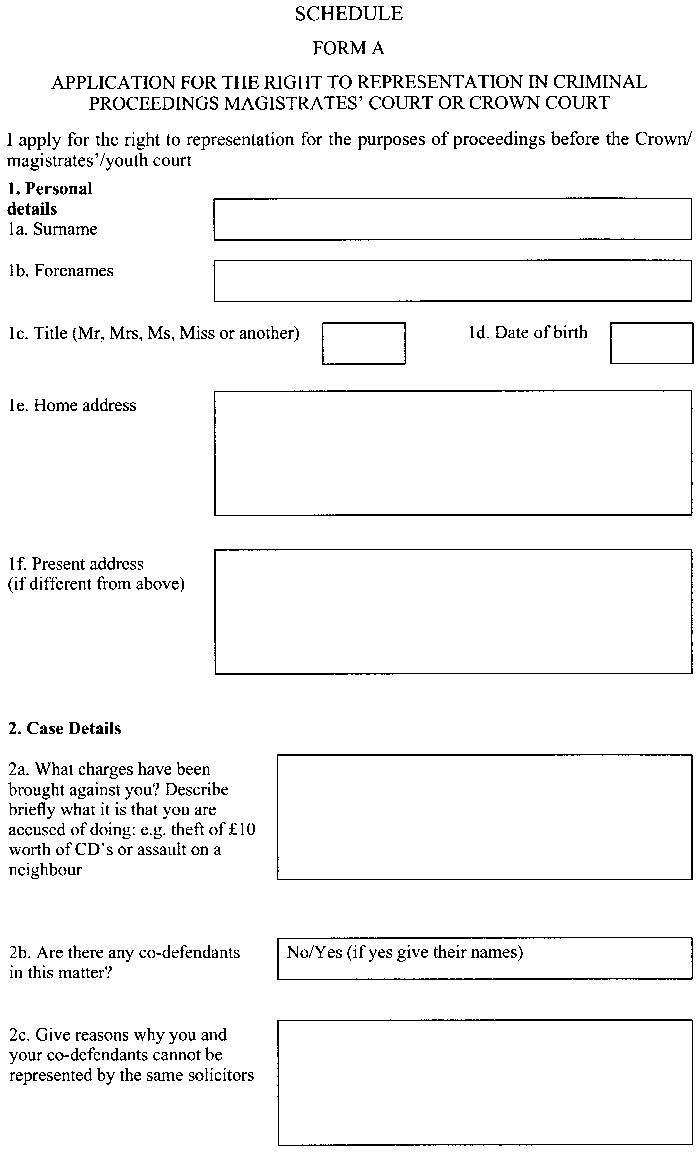
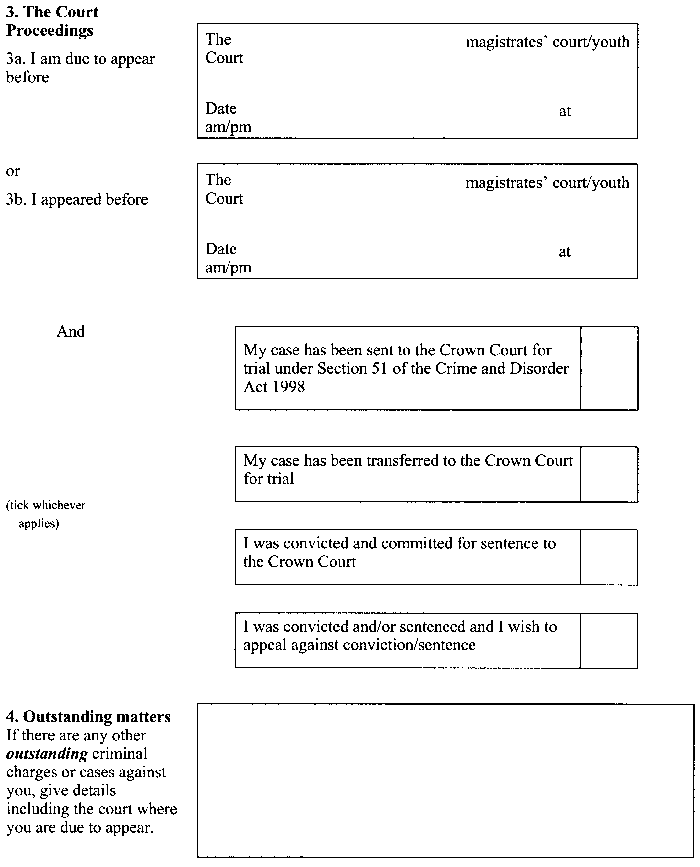
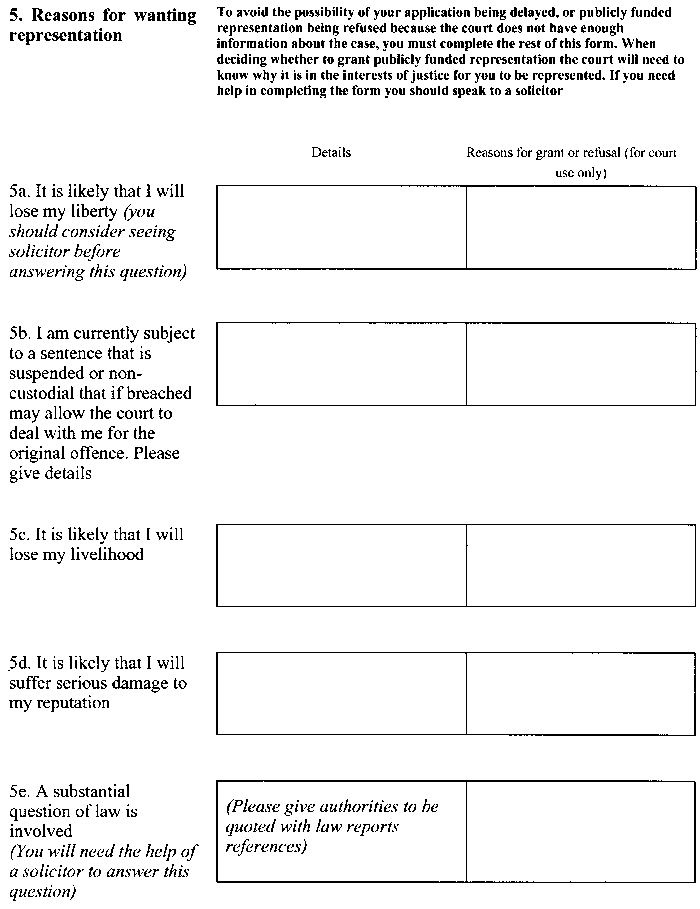
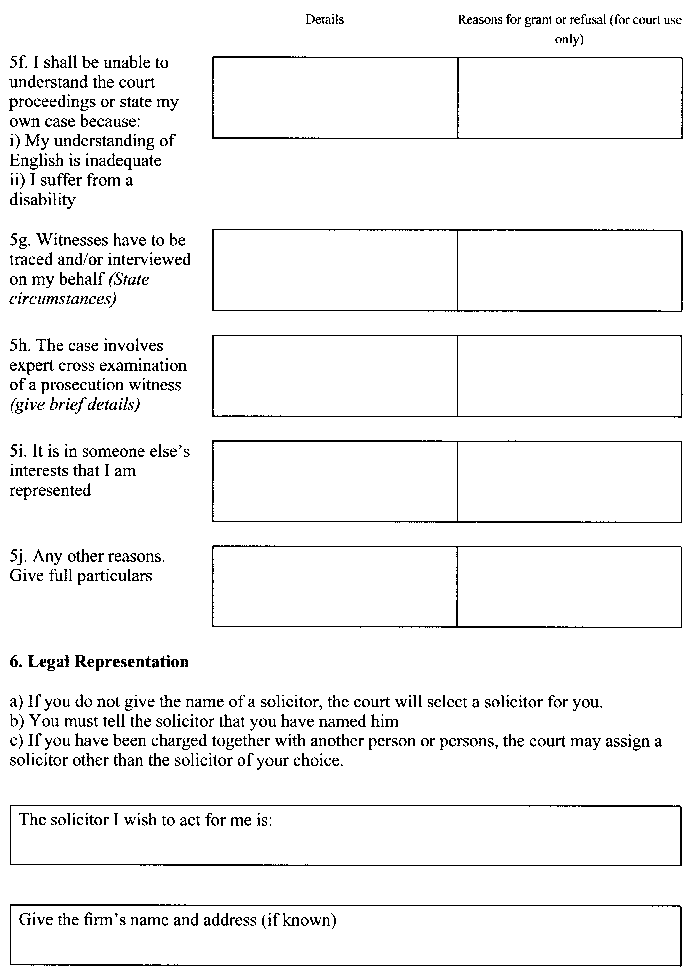
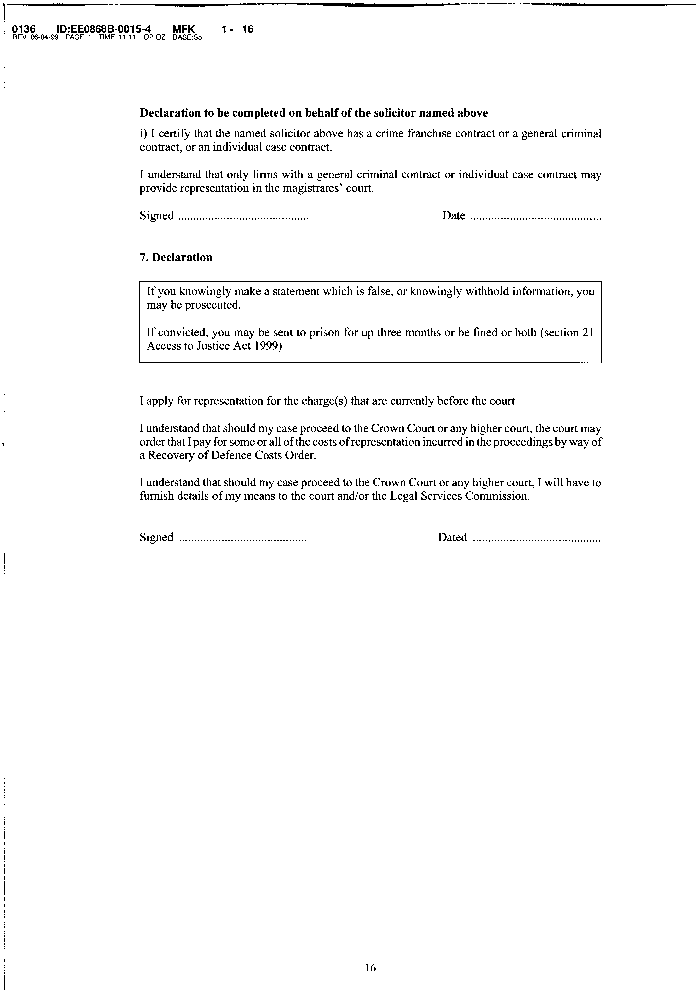
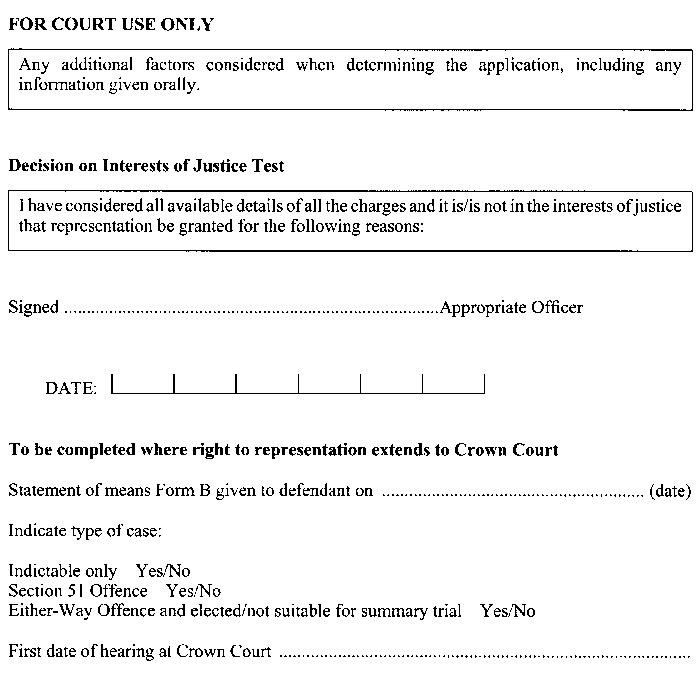
EXPLANATORY NOTE
(This note is not part of the Regulations)
These Regulations govern the provision of representation by the Criminal Defence Service under Part I of the Access to Justice Act 1999.
They provide for, inter alia,
(a) the proceedings which are prescribed as criminal proceedings for the purposes of section 12(2)(g) of the Act;
(b) the manner in which applications for the grant of a representation order are to be made;
(c) the representatives who may provide legal services; and
(d) the withdrawal of representation.
Notes:
[1]
1999 c.22.back
[2]
1998 c.37.back
[3]
1989 c.37. Sections 14B, 14D, 14G and 14H were inserted by paragraph 2, and sections 21B and 21D by paragraph 4, of Schedule 1 to the Football (Disorder) Act 2000 (c.25).back
[4]
1996 c.25.back
[5]
S.I. 1998/3132. Order 115 was amended by S.I. 1999/1008.back
[6]
1998 c.37.back
[7]
1987 c.38, as amended by the Criminal Justice Act 1988 (c.33), the Legal Aid Act 1988 (c.34) and the Crime and Disorder Act 1998 (c.37).back
[8]
1980 c.43.back
[9]
1968 c.19.back
[10]
1989 c.33.back
ISBN
0 11 029215 4
| © Crown copyright 2001 |
Prepared
6 April 2001
|
BAILII:
Copyright Policy |
Disclaimers |
Privacy Policy |
Feedback |
Donate to BAILII
URL: https://www.bailii.org/uk/legis/num_reg/2001/20011144.html







